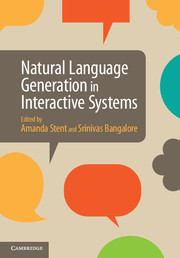Book contents
- Frontmatter
- Contents
- List of contributors
- 1 Introduction
- Part I Joint construction
- Part II Reference
- 5 Referability
- 6 Referring expression generation in interaction: A graph-based perspective
- Part III Handling uncertainty
- Part IV Engagement
- Part V Evaluation and shared tasks
- Author index
- Subject index
- References
5 - Referability
from Part II - Reference
Published online by Cambridge University Press: 05 July 2014
- Frontmatter
- Contents
- List of contributors
- 1 Introduction
- Part I Joint construction
- Part II Reference
- 5 Referability
- 6 Referring expression generation in interaction: A graph-based perspective
- Part III Handling uncertainty
- Part IV Engagement
- Part V Evaluation and shared tasks
- Author index
- Subject index
- References
Summary
Introduction
A key task of almost any natural language generation (NLG) system is to refer to entities. Linguists and philosophers have a long tradition of theorizing about reference. In the words of the philosopher John Searle,
Any expression which serves to identify any thing, process, event, action, or any other kind of individual or particular I shall call a referring expression. Referring expressions point to particular things; they answer the questions Who?, What?, Which?
(Searle, 1969)Referring expression generation (REG, sometimes GRE) is the task of producing a (logical or natural language) description of a referent that allows the reader to identify it. In producing a referring expression, an NLG system can make use of any information that it can safely assume the hearer to possess, based on a model of the world and of the hearer's knowledge about the world (the knowledge base(KB)). Given a REG algorithm and a KB, the following questions can be asked:
How many entities is the algorithm able to identify? We will call this the expressive power of an algorithm. Loosely speaking, the more entities the algorithm is able to single out, the greater its expressive power.
How empirically adequate are the referring expressions generated by the algorithm? For example, how human-like are they – to what extent do they resemble the human-produced referring expressions in a corpus? How effective are they – to what extent do they enable a human recipient to identify the referent easily, quickly, and reliably?
Information
- Type
- Chapter
- Information
- Natural Language Generation in Interactive Systems , pp. 95 - 125Publisher: Cambridge University PressPrint publication year: 2014
